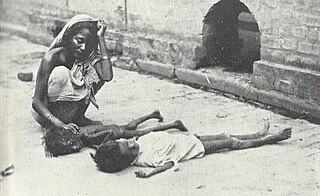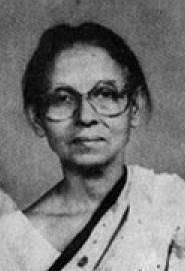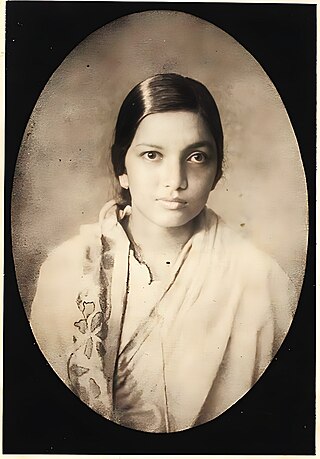The Mahila Atma Raksha Samiti (Bengali : মহিলা আত্মরক্ষা সমিতি, 'Women's Self-Defense Association, abbreviated MARS) was a women's movement in Bengal, India. [1] MARS was a mass organisation linked to the Communist Party of India. [2]
MARS was founded in 1942, in the midst of the Second World War and on the eve of the Great Bengal famine. [1] [3] Calcutta was filled with women fleeing from famine in the country-side, becoming prey for sexual exploitation (either sent to military camps or lured or forced into prostitution in the city). [3] [4] The number of women in the brothels of Calcutta doubled. [4] Incidents of sexual abuse or kidnappings of local women by American soldiers were taking place. In reaction to these developments, a group of communist women organised MARS. [3] MARS had its origin in the Congress Mahila Sangha, formed in Calcutta in 1939 with the objective to prepare for defense against a Japanese occupation of Bengal. In 1941 the group had been joined by communist women, some recently released from prison. [4]
Rani Mitra Dasgupta, Manikuntala Sen and Renu Chakravartty were key leaders of MARS. But the organisation also gathered prominent non-communist, liberal women like Rani Mahalanobis (wife of Prasanta Chandra Mahalanobis) and Leela Mazumdar. [3] Mahalanobis served as the president of MARS. [5]
MARS supported the struggle for Indian independence, instructed women in self-defense, warned against fascism, demanded release of political prisoners and sought to defend the population from starvation. [1] [4] The organisation mobilised relief activities for famine-stricken communities. [6] On 17 March 1943 MARS mobilized 5,000 women to march to the Bengal Legislative Assembly in protest against price hikes on food items. [1] [4] The Calcutta march was followed by hunger marches in Dinajpur, Chittagong, Midnapur, Badarganj, Madaripur, Pabna and Bankura. [4] MARS held its first conference in April 1943. It was presided by Mohini Devi and Ela Reid acted as the organising secretary. [4]
MARS branches were set up in every district of Bengal and protests were mobilized across he province. By 1944 the movement counted 43,500 members. [1] MARS would later play a key role in the Tebhaga struggle. [1] "Tebhaga andolan Jodi prodeep hoye taahole MARS holo sholte pakano" (If the Tebhaga movement were a lamp, then the Mahila Atmaraksha Samiti (MARS) represented the rolling of the wick). [7] "By the time Tebhaga started, a critical factor had been at work that had prepared both urban and rural women in Bengal for participation in peasant struggle. This was the experience of joint political work in an organized women's movement coordinated by MARS since 1942, and the sustained interaction of urban MARS and Communist Party (CP) activists with a devastated rural populace in the relief work and political marches during and after the Bengal famine of 1943. This historical experience of MARS had marked women's participation in Tebhaga as qualitatively different from those in the pre-Tebhaga agrarian movements such as the Tanka, Hattola and Adhiar in which peasant women had already become politically active by 1937, though not in such large numbers as in Tebhaga." [8]
In 1947, the name of the organisation was changed to Paschim Bangha Mahila Atma Raksha Samti (পশ্চিমবঙ্গ মহিলা আত্মরক্ষা সমিতি, 'West Bengal Women's Self-Defense Association'). [9] On 27 April 1949 MARS organised a rally in Calcutta in support of the hunger strike of political prisoners. Police opened fire on the demonstration at Bowbazar, killing six persons. [10]
By April 1954 MARS claimed a membership of 18,000, out of whom the majority belonged to the peasantry or worked in jute mills. [2] MARS took the initiative for the foundation of the National Federation of Indian Women two months later. [2] [11]

Tebhaga movement (1946–1947) was significant peasant agitation, initiated in Bengal by the All India Kisan Sabha of peasant front of the Communist Party of India.

The National Federation of Indian Women is a women's organisation in India, the women's wing of the Communist Party of India. It was established in 1954 June 4 by several leaders from Mahila Atma Raksha Samiti including Aruna Asaf Ali.

The Bengal famine of 1943 was a famine in the Bengal province of British India during World War II. An estimated 800,000–3.8 million people died, in the Bengal region, from starvation, malaria and other diseases aggravated by malnutrition, population displacement, unsanitary conditions, poor British wartime policies and lack of health care. Millions were impoverished as the crisis overwhelmed large segments of the economy and catastrophically disrupted the social fabric. Eventually, families disintegrated; men sold their small farms and left home to look for work or to join the British Indian Army, and women and children became homeless migrants, often travelling to Calcutta or other large cities in search of organised relief.

Ila Mitra was an Indian communist and peasants movement organizer of the Indian subcontinent, especially in East Bengal.

Anushilan Samiti was an Indian fitness club, which was actually used as an underground society for anti-British revolutionaries. In the first quarter of the 20th century it supported revolutionary violence as the means for ending British rule in India. The organisation arose from a conglomeration of local youth groups and gyms (akhara) in Bengal in 1902. It had two prominent, somewhat independent, arms in East and West Bengal, Dhaka Anushilan Samiti, and the Jugantar group.

All India Mahila Samskritik Sanghatan (AIMSS) is the women's wing of the Socialist Unity Centre of India (Communist). AIMSS is active in 19 States. All India President and General Secretary is Keya De and Chabi Mohanty.

Gurusaday Dutt was a civil servant, folklorist, and writer. He was the founder of the Bratachari Movement in the 1930s.
Manikuntala Sen was one of the first women to be active in the Communist Party of India. She is best known for her Bengali-language memoir Shediner Kotha, in which she describes her experiences as a woman activist during some of the most turbulent times in India's history.

The Durbar Mahila Samanwaya Committee, or simply Durbar, is a collective of 60,000 sex workers in West Bengal. Established on 15 February 1992, in Sonagachi, the largest red-light district in Kolkata, West Bengal, India with estimated 11,000 sex workers, Durbar has been working on women's rights and sex workers' rights advocacy, anti-human trafficking and HIV/AIDS prevention. The Durbar states that its aims are the challenging and altering of the barriers that form the everyday reality of sex workers' lives as they relate to their poverty or their ostracism. Durbar runs 51 free clinics for sex workers across West Bengal, with support from organisations such as the Ford Foundation and the National AIDS Control Organisation (NACO), who also help Durbar in its initiatives like networking, rights protection and creating alternative livelihood for sex workers.

Somnath Hore (1921-2006) was an Indian sculptor and printmaker. His sketches, sculptures and prints were a reaction to major historical crises and events of 20th century Bengal, such as the Bengal Famine of 1943 and the Tebhaga movement. He was a recipient of the Indian civilian honour of the Padma Bhushan.

All India Federation of Democratic Women is a women's organisation in India, being the women's wing of the Marxist Communist Party of India (United). P. Krishnammal, a Kerala State Committee member of MCPI(U), is the general secretary of AIFDW. Previously it was the women wing of the main predecessor of MCPI(U), the Marxist Communist Party of India.

Kalpana Datta, also Kalpana Joshi, was an Indian independence movement activist and a member of the armed independence movement led by Surya Sen, which carried out the Chittagong armoury raid in 1930. Later she joined the Communist Party of India and married Puran Chand Joshi, the general secretary of the party in 1943.
Bangladesh Mahila Parishad is a women's human rights organization. It was established on 4 April 1970. After the liberation war, Bangladesh Mahila Parishad was registered under the society act in 1976, in the free Bangladesh. It is supported by Norway.
National Alliance of People's Movements is an alliance of alter-globalisation activist groups in India. It is an umbrella organisation for various civil society organisations and individuals working towards similar goals.
Barada Bhushan Chakraborty was a revolutionary peasant leader in Bangladesh.
Krantikari Adivasi Mahila Sangathan is a banned women's organisation based in India. The Krantikari Adivasi Mahila Sangathan (KAMS) is a successor of the Adivasi Mahila Sanghathana (AMS). The foundation of the AMS was laid by the Maoists in 1986.
Nari Mukti Sangh is a revolutionary women's organisation in India, with its focus of operations in Bihar and Jharkhand. The organisation was founded in March 1990, during a women's conference at Talekocha in Giridih, which was held to organise women, especially from Adivasi communities, to struggle against the exploitation, oppression and atrocities faced by them. An executive committee of the organisation was also elected at the conference. It had seven members, including its president, secretary and a treasurer. Presently, the Nari Mukti Sangh (NMS) draws considerable membership from the states of Bihar, Chhattisgarh, Jharkhand, West Bengal and Delhi.
Renu Chakravartty (1917-1994) was a leader of Communist Party of India, noted parliamentarian and educationist.

Vidya Munshi was a journalist and leader of Communist Party of India. She has been called, arguably, the first woman journalist of India.
Sarala Roy (1861-1946) was an Indian educator, feminist, and social activist. She was one of the first women to matriculate from Calcutta University, and was the first woman to be a member of the University Senate. She founded a school for girls and several women's educational charities, and was a founding member and later, the President of the All India Women's Conference. As President of the All India Women's Conference in 1932, she played a key role in organizing efforts towards women's suffrage, and against child marriage. She was also a strong supporter of educational rights for women and girls.